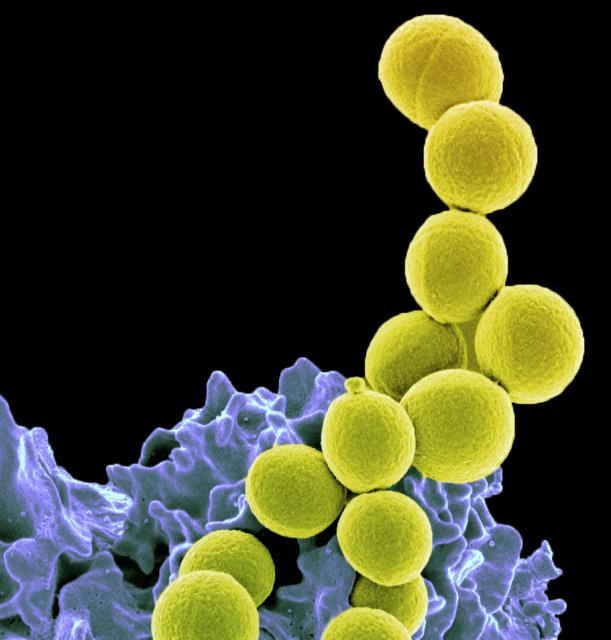One of the bacteria found in the nasal mucosa, getting rid of competitors using antimicrobial “chemical weapons”.
Bacteria are able to adapt very well to the antibiotics and now you can often hear about the very real arms race between microbes and humans.

Drug-resistant MRSA strain of Staphylococcus aureus. (Photo by NIAID / www.flickr.com/photos/niaid/5614218718.)
In the search for new drugs that would overcome bacterial resistance to antibiotics, physicians and biologists are all more clever tricks: for new antibacterial substances are investigated microorganisms, which generally cannot be grown in the laboratory, attempts to create a cure that is similar to a virus, etc.
New, it is really an amazing source of antimicrobial agents, describe in their article in Nature , researchers from the University of tübingen: another promising antibiotic, they found not just anywhere, but in the human nose.
According to statistics, every third person in the nasal cavity can be found Staphylococcus aureus Staphylococcus aureus, which is simply sitting on the skin or on the mucous membrane, behave decently, but once in the body, can cause a variety of diseases from boils to pneumonia and sepsis.
In addition, Staphylococcus aureus is a known MRSA strain possessing the MDR. “Superbacteria” MRSA long been a headache for doctors: in the United States from antibiotic-resistant staph infection annually kills about 10 thousand people; it is clear, why S. aureus has attracted increased attention from physicians and biologists.
And here Bernhard Krismer (Bernhard Krismer), Andreas Peschel (Peschel Andreas) and their colleagues wanted to know why this bacterium is found in every nose. It turned out that all the matter of competition between different microbes. In the nasal mucosa are other staphylococci, not only Golden staph. However, habitat is scarce in nutrients, so the bacteria all the time looking for a way to get rid of competitors. One of these substances synthesized by Staphylococcus S. lugdunensis, is called lugdunon (lugdunin): S. lugdunensis displaces from the nasal mucosa of S. aureus.
According to the authors, lugduni inhibited the growth of Staphylococcus aureus in cell culture, and on the skin of mice, and, most importantly, he was effective not only against normal S. aureus, but also against drug-resistant MRSA. Moreover, MRSA, even a month later and could not become resistant to the new medium.
Antibiotics in most cases are chemical weapons, which some bacteria (or fungi) are fighting with others. Lugdunon is no exception: S. lugdunensis is very effectively used against S. aureus is of 187 people who have analyzed the composition of the microflora of the nose, 60 people were Staphylococcus aureus, 17 – S. lugdunensis, and only one – both bacteria together.
Perhaps when we learn the mechanism of action of a new antibiotic, it also can be made more powerful. The very bacterium is S. lugdunensis to use as medicine will not work, since it is associated with infections of the eyes, skin, joints and even heart.
Most unusual here, where got another antibacterial substance not from the soil bacteria, not from underground caves, and from their own human microflora. The community of microorganisms that live up your nose, on skin, in eyes, for a long time have learned to deal with competitors, so that ruled out that our own microbes can be a fresh source not yet tried antibiotics.
However, we should not forget that, in principle, the use of antibiotics in the recent times is facing growing skepticism: the ability of bacteria to adapt to them seem limitless, and let the same Staphylococcus aureus to become resistant to lugdunon thirty days – it will be in six months or a year.
So in parallel with the search for new antibiotics it is better to look for some other, fundamentally different ways to deal with bacterial infections.
Author: Cyril Stasevich
Source: nkj.EN






